-
One day after U.S. House Speaker Nancy Pelosi (D-California) visited Springfield to rev up the Democratic base at the Governor’s Day brunch held by the Illinois Democratic County Chairs’ Association, the Democrat’s face loomed over the crowd assembled for Republican Day programming on the Director’s Lawn at the state fairgrounds — along with grayscale headshots Gov. JB Pritzker and House Speaker Mike Madigan (D-Chicago) — urging Republicans to “fight the machine.”
 U.S. Rep. Steve Scalise (R-Louisiana) addresses the crowd at Republican Day on the state fairgrounds Thursday, telling the Illinois GOP the party can rebuild. [Hannah Meisel/The Daily Line]
U.S. Rep. Steve Scalise (R-Louisiana) addresses the crowd at Republican Day on the state fairgrounds Thursday, telling the Illinois GOP the party can rebuild. [Hannah Meisel/The Daily Line]
-
While U.S. House Speaker Nancy Pelosi (D-California) was billed as keynote speaker for Wednesday morning’s annual Illinois Democratic County Chairs’ Association brunch in Springfield, it was Gov. JB Pritzker who got the crowd of Democratic party faithful revved up as he promised a “blue tsunami” to continue last year’s “Blue Wave” that swept Democrats into office at all levels of government in November in a rebuke of President Donald Trump and former Gov. Bruce Rauner.
 U.S. House Speaker Nancy Pelosi (D-California) briefly speaks to reporters after the Illinois Democratic County Chairs’ Association brunch in Springfield Wednesday. [Hannah Meisel/The Daily Line]
U.S. House Speaker Nancy Pelosi (D-California) briefly speaks to reporters after the Illinois Democratic County Chairs’ Association brunch in Springfield Wednesday. [Hannah Meisel/The Daily Line]
As more than 2,100 Democrats milled about the lobby of the Crowne Plaza Hotel and Convention Center early Wednesday, many bought T-shirts for sale that proclaimed “Illinois Democrats get BIG things done,” a riff on Pritzker’s campaign promises to “Think Big,” and a continuation of his branding for Democrats’ legislative wins listed on the back of the $25 shirt.
Wednesday’s featured speakers boasted of the legislative victories, which include what they claim is the state’s first on-time and balanced budget in years, a $45 billion infrastructure plan, massive gambling expansion — including legalizing sports betting — recreational marijuana, a $15 minimum wage by 2025 and the Reproductive Health Act.
Pelosi, whose lengthy remarks largely focused on Trump and U.S. Senate Majority Leader Mitch McConnell (R-Kentucky), congratulated Pritzker, saying “you get big things done,” and called him a “model to the nation.” The California Democrat noted that she’d been friends with Pritzker’s mother, Sue Pritzker, when the governor was growing up in the Bay Area, and said it brought “tears to my eyes to see him…command the issues” in Illinois.Pritzker praised Pelosi for her navigation of Washington as Speaker of the House and in dealing with Trump.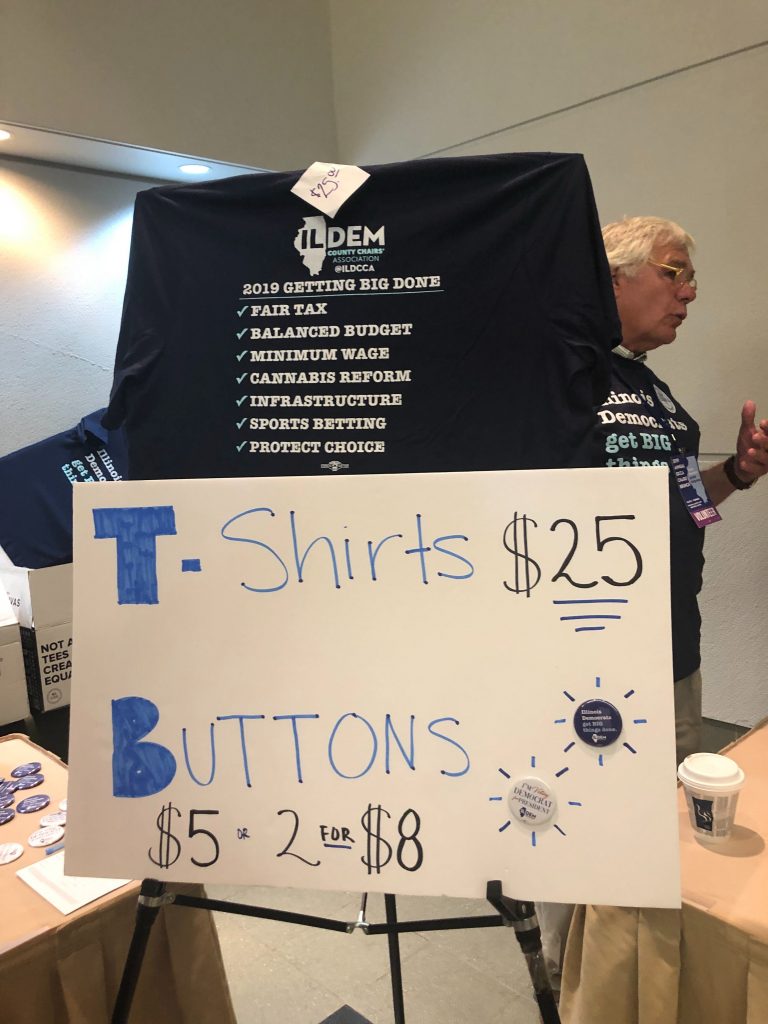 Merchandise for sale at the Illinois Democratic County Chairs’ Association brunch in Springfield Wednesday boasted Democratic legislative accomplishments from lawmakers’ Spring session. [Hannah Meisel/The Daily Line]
Merchandise for sale at the Illinois Democratic County Chairs’ Association brunch in Springfield Wednesday boasted Democratic legislative accomplishments from lawmakers’ Spring session. [Hannah Meisel/The Daily Line]
“I know I speak for everyone when I say thank God we didn’t send a man to do a woman’s job,” Pritzker said.
Pelosi praised the “persistent, bold experimentation” coming out of Illinois, saying that here and elsewhere, she sees evidence that “a mainstream agenda can also be a progressive agenda.” She referred to McConnell as “Moscow Mitch,” and used his own branding — describing himself as the “Grim Reaper” — against him.
“Since I’m in Springfield I’ll just quote a Republican president, Abraham Lincoln,” Pelosi told the crowd. “He said, ‘Public sentiment is everything.’ With it, you can accomplish almost anything, without it practically nothing.”
One Democrat who intimately understands public sentiment is House Speaker Mike Madigan, who is even more unpopular in his own state than Pelosi is, according to recent polling data. Madigan, who has mostly stayed in the shadows for Pritzker’s first year in office after being extremely visible for four years fighting Rauner, spoke for only three minutes Wednesday morning before departing out the back door.Though some Republicans last year acknowledged that a constant message of blaming Madigan may no longer be a winning one, a coalition formed to stop one of Pritzker’s top priorities — implementing a graduated income tax in Illinois via a constitutional amendment — put Madigan in the center of its branding Wednesday.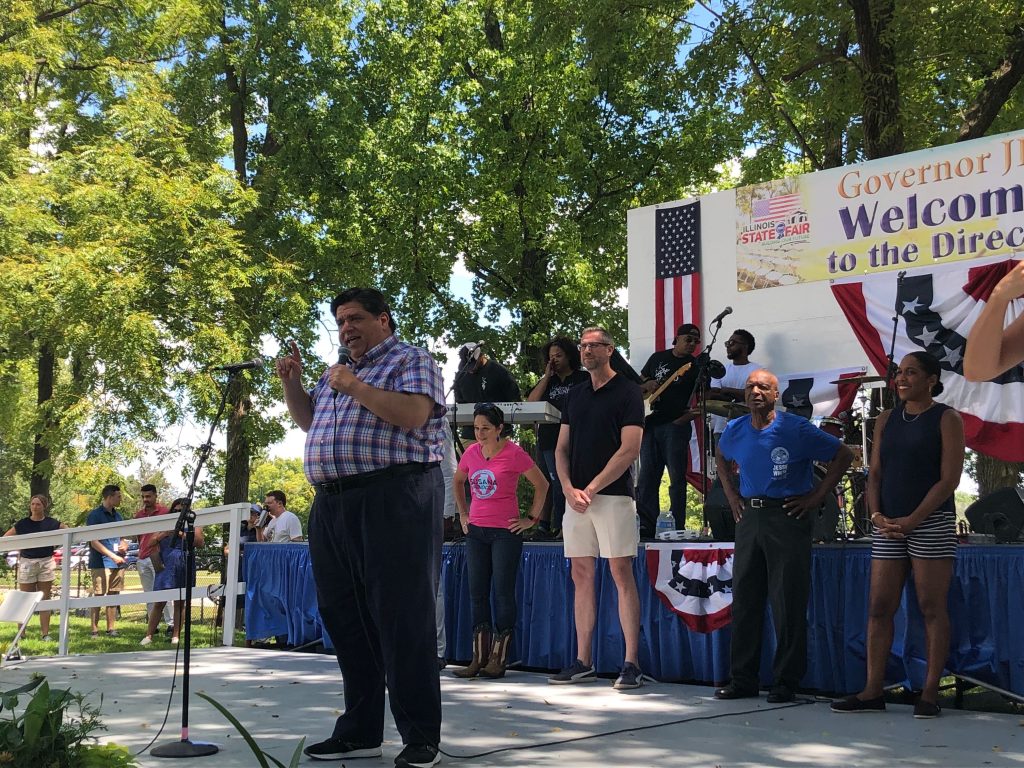 Gov. JB Pritzker addresses the crowd on the Director’s Lawn at the Illinois State Fairgrounds on Wednesday, Democrats’ first Governor’s Day since 2014. [Hannah Meisel/The Daily Line]
Gov. JB Pritzker addresses the crowd on the Director’s Lawn at the Illinois State Fairgrounds on Wednesday, Democrats’ first Governor’s Day since 2014. [Hannah Meisel/The Daily Line]
Greg Baise, the former head of the Illinois Manufacturers’ Association and current chair of Ideas Illinois, a 501(c)4 group dedicated to defeating what Pritzker has branded as the “Fair Tax,” announced a political action committee dedicated to the cause, dubbed the “Vote No on Blank Check Committee.”
The committee’s logo features the longtime House Speaker’s face, and polling released this Spring from Baise-connected We Ask America and commissioned by Ideas Illinois, found Madigan sits at an 18 percent favorability rating. A March poll from the Paul Simon Public Policy Institute at Southern Illinois University didn’t see Madigan faring much better, with only a 20 percent job approval rating.
Madigan, who is also the chair of the Democratic Party of Illinois, conducted what he jokingly called a “public opinion poll” gauged by the friendly crowd’s reaction.
“Are you happy about the fact that this year Illinois has a full-year budget, on time and balanced?” Madigan asked, with the crowd cheering for that and other Democratic victories, including a contract negotiated for approximately 80,000 state workers represented by AFSCME Council 31 — their first since 2015.
“All these things happened because there was a change in the occupant of the governor’s office in Illinois,” Madigan said. “We came together and decided that a budget impasse that lasted two and a half years was not acceptable…and we gathered together and we rallied, we removed Rauner from office and installed our governor, JB Pritzker.”After telling the crowd to enjoy their day, Madigan left the building without any chance of being intercepted by reporters. Earlier this summer, the Tribune reported on a series of FBI raids at the homes and offices of some of the speaker’s closest allies, apparently in connection with checks written to former Madigan political staffer Kevin Quinn.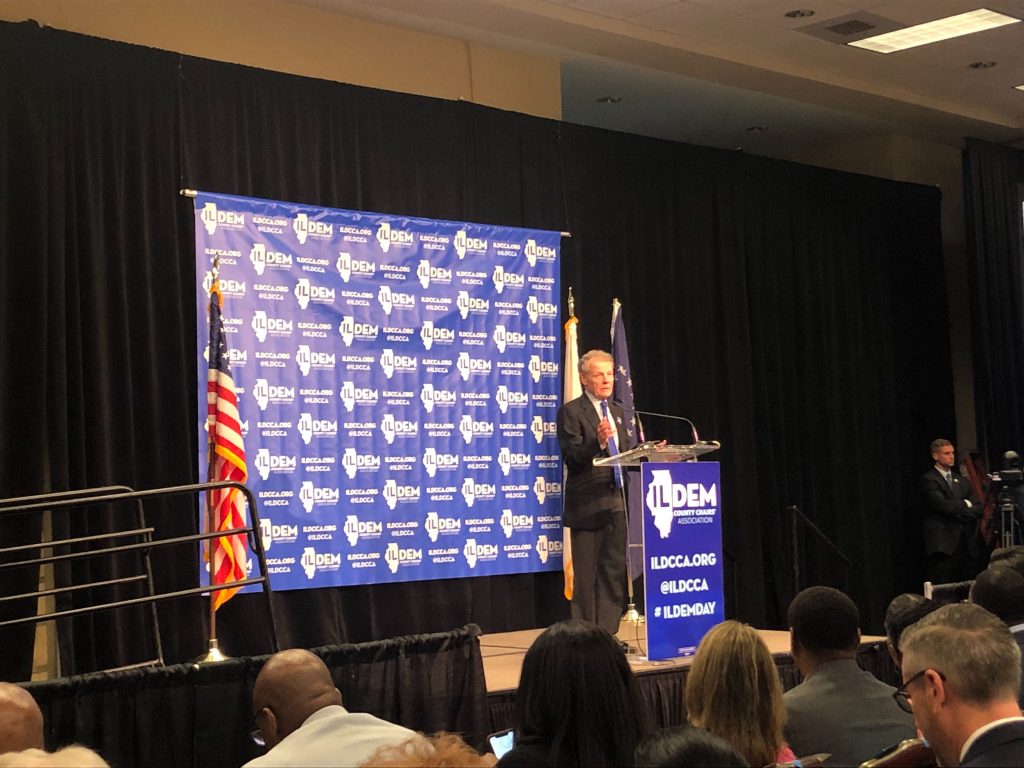 House Speaker Mike Madigan (D-Chicago) tells the crowd that big Democratic wins were all made possible by removing former Gov. Bruce Rauner from office and “installing our governor, JB Pritzker.” [Hannah Meisel/The Daily Line]
House Speaker Mike Madigan (D-Chicago) tells the crowd that big Democratic wins were all made possible by removing former Gov. Bruce Rauner from office and “installing our governor, JB Pritzker.” [Hannah Meisel/The Daily Line]
Madigan fired Quinn last year as campaign worker Alaina Hampton went public with her accusations that Quinn had harassed her in pursuit of a romantic relationship, and that Hampton had not been protected from his advances.
Madigan also dodged potential questions about State Sen. Tom Cullerton (D-Villa Park), who two weeks ago was indicted on 41 charges related to having been a “ghost payroller” for the Teamsters Joint Council 25 for the first three years he served in the Senate.
Cullerton’s arraignment, originally scheduled for Wednesday, was moved to Friday morning at the Dirksen Federal Court building in Chicago.
Cullerton’s caucus leader, Senate President John Cullerton (D-Chicago), who is a distant cousin of the indicted politician, told reporters again Wednesday that Cullerton is presumed innocent until proven guilty. Cullerton was removed from his chairmanship of the Senate’s Labor Committee, but was given another chairmanship, which lets him keep a $10,000 bump in his legislative pay.
“It is what it is and he’s got to face the charges,” Senate President Cullerton said Wednesday.
Attorney General Kwame Raoul, who served in the Senate with Cullerton, declined to speculate on whether it’s appropriate for Cullerton to continue serving while facing 41 counts, many of which are labeled as embezzlement of nearly $275,000 from the union over three years.
“I have nothing to say about that particular case,” Raoul told The Daily Line. “I am a former member of the General Assembly. I now serve in a role as a law enforcement officer for the state, so I would reserve any comment, as any responsible law enforcement officer would do.”
Not many present at Wednesday’s festivities at the county chairs’ brunch or out on the Director’s Lawn at the state fairgrounds volunteered to speak on the record about any sort of pall the FBI investigations have cast over the Democratic Party as the party tries to repeat wins in 2020.
One standout freshman House Democrat, State Rep. Joyce Mason (D-Gurnee), was featured in a video screened at Wednesday’s brunch about her surprise victory over former State Rep. Sheri Jesiel (R-Winthrop Harbor) in November.
Mason, who ran on a platform that included protecting abortion access in Illinois, said she was cognizant of the bigger picture hanging over the collective head of the Democratic Party in Illinois, but said it hasn’t come up while talking with constituents this summer while knocking on doors, as directed by Madigan.
“On one hand, it feels really far away because I’m such a newcomer,” Mason told The Daily Line. “It’s not like I’m hanging out with those guys, so it seems very far away. On the other hand, I’m focusing on everything we’re working on…and you know, I just try to let it play out and see what happens. I’ve heard stuff like, ‘Oh, people just make stuff up, it’s going to go away’ [or] ‘it’s not going to go away.’ Regardless of that, I just keep working for my hometown and my district. It’s one of those things, I guess.”
Mason was one of the female freshman House Democrats who State Rep. Kelly Cassidy (D-Chicago) and others have repeatedly given credit to as the driving force behind the passage of the Reproductive Health Act in late May, even after the speaker had put a brick on the bill.
Related: ‘Watch the rollercoaster, don’t ride it:’ Rep. Cassidy — The Aldercast -
Citing the state’s plans to spend a $45 billion on infrastructure in the next six years, Comptroller Susana Mendoza on Tuesday signed an executive order vowing her office will will refuse to pay construction vendors who aren’t paying workers the prevailing wage.
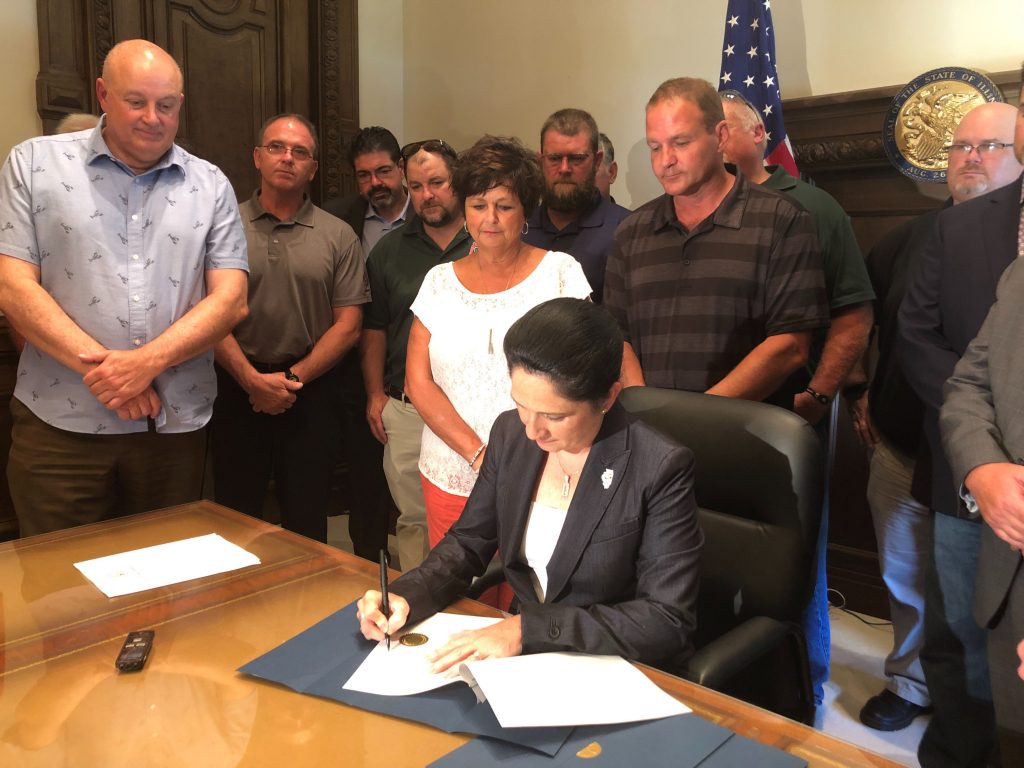 Illinois Comptroller Susana Mendoza signs an executive order requiring firms to pay the prevailing wage. [Hannah Meisel/The Daily Line]
Illinois Comptroller Susana Mendoza signs an executive order requiring firms to pay the prevailing wage. [Hannah Meisel/The Daily Line]
-
Six years after a limited medical marijuana pilot project was signed into law in Illinois, Gov. JB Pritzker’s signature on Friday significantly expanded the now-permanent program that is booming.
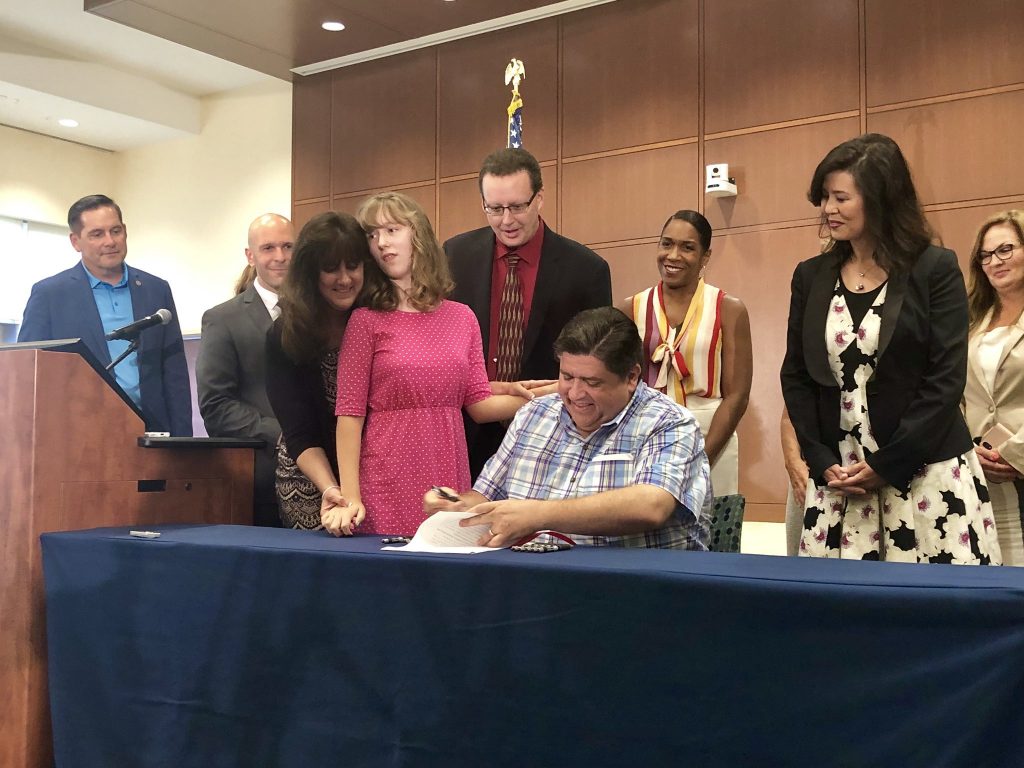 Gov. JB Pritzker signs a bill making an expanded state's medical marijuana program permanent. [Submitted]
Gov. JB Pritzker signs a bill making an expanded state's medical marijuana program permanent. [Submitted]
-
On a late August morning last summer, the state’s Office of Executive Inspector General received an odd tip: an employee of the Abraham Lincoln Presidential Library and Museum was in the process of sawing a wooden desk into pieces and disposing of the parts in a dumpster in the parking lot of the museum in Springfield.
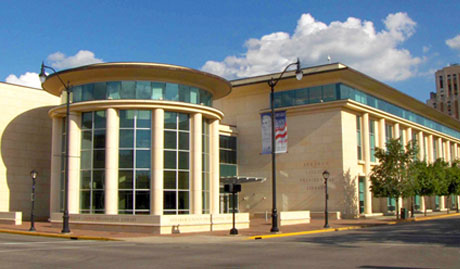 Abraham Lincoln Presidential Library and Museum [Submitted]
Abraham Lincoln Presidential Library and Museum [Submitted]
Upon receiving the call, investigators looked out their 14th floor windows and spotted the man using a machine saw to cut apart some sort of decorative wooden wall. They took photos of the scene. The tipster said the desk had once been in Springfield’s old Union Station, and may have had historical value.
The incident set off months worth of interviews and an eventual conclusion that the desk had indeed been purchased a decade before for $22,600 and its destruction was both a violation of state law and a missed opportunity for revenue to the state in a little-known program that brings in a few million dollars for Illinois every year.
-
Even after a bill is passed and signed by the governor, though it may have an immediate effective date in the legislative language, some measure of rule-making from an agency or state board may delay the actual implementation of a new law.
In the six weeks after Gov. JB Pritzker signed a massive gaming expansion bill into law — one of the major revenue sources for a $45 billion infrastructure plan, the city of Chicago missed a deadline to hire a consultant for a feasibility study of a new casino granted to the city under SB 690, and Pritzker’s administration scrambled to fill two spots on the Illinois Gaming Board, including the board chair.
But now that the board has been filled and the city contracted with Nevada-based Union Gaming for a feasibility study, the Illinois Gaming Board’s administrator on Thursday said emergency rules are nearly ready to go, allowing other parts of the new law tweaking existing casinos and video game terminals throughout the state.
-
Saying they need to “get to the bottom of this injustice,” Illinois lawmakers grilled university and state financial aid officials Thursday about how to prevent families from exploiting guardianship laws to obtain need-based college financial aid they wouldn’t otherwise receive.
 Members of the Illinois House higher education committee and appropriations-higher education committee listen to testimony from university and state financial aid officials during a hearing Thursday about parents who gave up guardianship of their college-bound children to qualify for financial aid. The hearing was at the Bilandic Building in downtown Chicago. [Pat Nabong for ProPublica Illinois]
Members of the Illinois House higher education committee and appropriations-higher education committee listen to testimony from university and state financial aid officials during a hearing Thursday about parents who gave up guardianship of their college-bound children to qualify for financial aid. The hearing was at the Bilandic Building in downtown Chicago. [Pat Nabong for ProPublica Illinois]
At a packed hearing in Chicago, more than a dozen members of the Illinois House discussed possible reforms, from tweaking state laws and educating judges who sign off on questionable guardianship changes to denying college admission to students whose families have exploited legal loopholes for financial gain.
“Need-based financial aid programs are a zero-sum game. When a student who does not qualify for the aid manipulates the system and is awarded money, there are students who are qualified for the aid who don’t receive it … and consequently they lose out on college altogether,” said State Rep. Carol Ammons, a Democrat from Champaign. “However, the rising costs of college should not be overlooked in this case. A system that drives families to cheat is a broken system.”
Yet lawmakers appeared unsure what they could do to stop the practice, even as they tried to pin down whether any laws were broken. “You’re not alarmed or think they committed an illegal act?” Rep. La Shawn K. Ford, a Chicago Democrat, asked one state financial aid official. “So we’re here only because we want to fix the moral compass of people?”
The hearing before two House higher education committees was called after a ProPublica Illinois investigation last week exposed how nearly four dozen families from the northern Chicago suburbs in Lake County went to court to give up legal guardianship of their children, sometimes a few months before they turned 18, to relatives or friends. Reporters subsequently identified an additional 10 cases in McHenry County and two in Cook County.
By having someone other than their parents be their legal guardian, students can declare themselves financially independent so their parents’ earnings and assets aren’t taken into account when applying for need-based federal, state and university grants. They can also qualify for subsidized federal student loans. The Wall Street Journal also reported on this issue.
Officials from the University of Illinois at Urbana-Champaign first flagged the questionable guardianship changes last summer and alerted federal authorities. University officials said they can decline to give institutional funds to these students but are obligated to award state and federal need-based grants.
At Thursday’s hearing, university officials implored lawmakers to give them the authority to reduce or block state need-based grants from the Monetary Award Program, known as MAP, in cases where students obtained independent status because of questionable guardianship transfers. MAP grants are worth $300 to $5,300 a year.
“That level of authority and flexibility would give us a much stronger set of tools to immediately and effectively address instances like the ones that we are discussing today,” said Michelle Trame, the University of Illinois director of student financial aid.
Trame urged lawmakers to enact safeguards soon since financial aid for the coming school year will be distributed before the end of August.
Ford, who chairs the House higher education appropriations committee, told reporters after the hearing he was not convinced that giving universities discretion to reduce MAP grants was the solution. Instead, he said the focus should be on educating judges and examining the guardianship law itself.
“It’s not illegal. We can make it illegal,” he said.
Ford and other lawmakers cautioned that they want to protect children in legitimate guardianships and avoid making the financial aid process unnecessarily burdensome for them.
Several lawmakers highlighted the need to hear from judges in future hearings. “We have no one here today from the judiciary, is that right? I’m a little bit concerned we may be getting ahead of our skis,” said Rep. Terri Bryant, a Republican from Mt. Vernon in southern Illinois. “It appears to me that this is a problem with the judiciary granting guardianship rather than what the schools are going to do about it.”
The Illinois Probate Act, the law that governs guardianship, does not specify circumstances in which guardianship should be denied. According to the law, a court can appoint a guardian if the parents consent, the minor agrees and the court determines it is in the child’s best interest.
ProPublica Illinois found that one judge in Lake County, Donna-Jo Vorderstrasse, approved dozens of guardianship changes brought to her court since January 2018 on behalf of college-bound students. Vorderstrasse, who has since moved to another division, declined to comment and referred questions to the court’s executive director, who did not return a call.
This year, however, another Lake County judge, Joseph Salvi, took over hearing guardianship cases and last month denied the guardianship petition of a 17-year-old who lived with his parents in suburban Long Grove.
Four days after Salvi denied the petition, the same family filed a new petition in McHenry County. The case was supposed to be heard Monday, but the family didn’t show up.
Eric Zarnikow, executive director of the Illinois Student Assistance Commission, which administers the MAP grant, told lawmakers his agency plans to reach out to judges to educate them about the potential abuse of guardianship.
Zarnikow also said it appears that the scheme came to light before it became widespread.
“The good news is this appears to have been caught early,” he said. “If this works in Illinois, it likely works in other states.”
State Rep. Dan Brady, a Republican from Bloomington-Normal in Central Illinois, said he thought the law may need “some fine-tuning.”
Noticeably absent from the hearing were families involved in the questionable guardianships and attorneys who filed the cases. In an interview after the hearing, Ford said lawmakers asked the universities to notify families of the hearing, but “nobody wanted to come.” Parents still may be subpoenaed to appear at future hearings, he said. Ammons also said after the hearing she thought it was appropriate for the state’s attorney general’s office, which is investigating the abuse of guardianships, to finish its work before families are called to testify.
“We don’t know yet what the AG is thinking,” Ammons said. “Is this considered theft?”
An attorney for some of the families, Mari Berlin, of the Kabbe Law Group, has said families who took part in the guardianship changes said they make too much money to qualify for financial aid but struggled to pay for college.
Lawmakers repeatedly asked for more information about the students who have enrolled at the University of Illinois at Urbana-Champaign, including their high schools and how much money they received in need-based grants. University officials declined to provide that information, citing privacy laws.
State Rep. William Davis, a Democrat from East Hazel Crest, in the southern suburbs of Chicago, asked university officials whether they could deny admission to applicants who misrepresented their true financial status. Andy Borst, director of undergraduate admissions at the university, said the issue wasn’t clear-cut.
“I feel like we were limited with the judges in the state saying, ‘Yes, this was a legal transfer of guardianship,’” Borst said. “We have to abide by that.”
University officials also asked lawmakers to regulate college consultants. Several of the families identified by ProPublica Illinois hired the same firm, Destination College, which boasts on its website of “strategies to lower tuition expenses.” The company’s owner, Lora Georgieva, has declined to comment to ProPublica Illinois but said elsewhere she did nothing wrong and was merely pointing families to a legally available option.
The reporting last week from ProPublica Illinois drew national attention and spurred the U.S. Department of Education’s Office of Inspector General to call for reforms. That office, which called the tactic “student aid fraud,” has recommended adding language on federal financial aid forms to clarify that students involved in this kind of guardianship no longer qualify for aid if they continue to receive medical and financial support from their parents.
In addition, other universities across Illinois and in other states have begun examining their own records to see if students in questionable guardianships had obtained financial aid to which they otherwise would not have been entitled.
At Thursday’s hearing, representatives from all of the state’s public university systems testified about the issues. None, apart from the University of Illinois at Urbana-Champaign, had identified any questionable guardianship cases. Illinois State University said it was still seeking further documentation from fewer than five students in guardianships.
Only one official from a private institution, Dominican University, testified at the hearing. Lawmakers said they hoped to hear from some of the most prestigious private universities in the state, including the University of Chicago, in future hearings.
In a recent interview, Loyola University Chicago’s associate director of financial aid, Kelsey Gerber, said her office began looking into questionable guardianships last year after learning of the practice from officials at DePaul University.
Loyola has since identified two applicants with a similar guardianship setup. When the university asked for additional documentation, Gerber said, the students didn’t respond and didn’t attend Loyola.
DePaul has seen a “small number” of these types of guardianship cases, a spokeswoman said in an email, adding that the university has been in touch with the U.S. Department of Education for guidance.
ProPublica Illinois is an independent, nonprofit newsroom that produces investigative journalism with moral force. Sign up for The ProPublica Illinois newsletter for weekly updates.
-
The first and only official truck stop in Waukegan sits on a lot so small that a tractor-trailer would have a hard time pulling in to pump gas, let alone parking for the night. It’s also located nearly 5 miles from the nearest interstate and is missing the kinds of amenities many truck drivers count on, such as a sit-down restaurant or showers.
 Patrons use video gambling machines at the Hunan Hibachi Buffet in Waukegan, Illinois, on a recent weekday morning. The buffet opens at 11 a.m., but gaming machines open at 8 a.m. [Nima Taradji for ProPublica Illinois]
Patrons use video gambling machines at the Hunan Hibachi Buffet in Waukegan, Illinois, on a recent weekday morning. The buffet opens at 11 a.m., but gaming machines open at 8 a.m. [Nima Taradji for ProPublica Illinois]
But what the Waukegan Thorntons lacks as a truck stop, it more than makes up for as a video gambling destination. Its five slot and poker machines bring in more than $100,000 a month, making it not only Waukegan’s most lucrative video gambling spot but also one of the most profitable in Illinois.
The story of how this truck stop came to be a gambling gold mine, the story of why it’s even considered a truck stop, is one element in a brazen series of maneuvers over several years by a video slot and poker operator to squeeze money from a struggling city. It also offers a glimpse into how Illinois’ gambling expansion is playing out across the state, particularly in communities desperate for its promised riches.
Located on the banks of Lake Michigan 40 miles north of Chicago, Waukegan once teemed with people and industry. Good jobs and affordable housing drew immigrants from around the world. But like in so many other Rust Belt cities, manufacturing’s decadeslong decline bled resources from the local government, hammered small businesses and, according to U.S. Census data, eroded the population, which has fallen 2.6 percent since 2010, to just shy of 87,000.
Since the early 1990s, city officials have lobbied the state for a casino, believing it would help pull Waukegan out of its financial doldrums. After repeated attempts fell short, the city went all in on video gambling after it was legalized in 2009 and quickly became one of the state’s top markets for it.
Then the city’s luck changed. In June, at the end of this year’s legislative session, Gov. J.B. Pritzker signed a massive gambling expansion bill that included six new casinos, including one in Waukegan.
And Waukegan’s largest video gambling operator was ready. Long before lawmakers approved the new casino, the owners of Tap Room Gaming, led by former State Sen. Michael Bond, had used big campaign contributions to help elect city officials sympathetic to their interests, which include controlling the new casino and steering it to a site abutting land one of them had purchased, a ProPublica Illinois investigation found.
Several people familiar with the writing of the gambling expansion law say that Bond, whose ties to the Democratic Party run deep, used his connections to state lawmakers to try to insert language into an earlier version of the bill that would have guaranteed Tap Room’s owners control of a Waukegan casino.
While Bond’s efforts on the bill ultimately failed, Tap Room scored a victory when the video gambling industry successfully beat back an attempt to tighten rules that would have barred the Waukegan Thorntons and dozens of other gas stations from running video slot and poker machines.
Bond remains in the running for the Waukegan casino. City officials said Monday they received six bids to develop and operate a casino, including one bid from Bond and a Las Vegas-based casino operator called Warner Gaming.
Pritzker and other state and local leaders say the latest gambling expansion will help fund borrowing for a $45 billion statewide building campaign, called Rebuild Illinois. The Waukegan casino, they say, will create much-needed jobs for the city while shoring up its woefully underfunded police and fire pension funds.
But promises tied to a gambling windfall have come up short in the past. In 2009, lawmakers rushed through a similar bill legalizing video slot and poker machines. They claimed the industry would generate hundreds of millions of dollars a year to pay borrowing costs for a similar building campaign, Illinois Jobs Now!
A ProPublica Illinois/WBEZ Chicago investigation in January found it took nearly a decade to reach the state’s rosy revenue projections, accelerating Illinois’ financial tailspin and saddling the state with new, unfunded regulatory and social costs in the meantime. In February, ProPublica Illinois/WBEZ Chicago showed how the state had failed to meaningfully address the fallout of gambling addiction.
Under the gambling legislation, Waukegan will receive just 3.5 percent of casino revenue, leaving some local officials skeptical about whether a casino will actually benefit the city as many officials hope.
“Gambling takes money from people, mainly poor people, and gives it to government and corporations,” said Ald. Lynn Florian, a Democrat from Waukegan’s 8th Ward on the Northwest Side, who opposes a city casino. “And in the case of the casino, our city will get just a fraction of that money.”
A Political Newcomer and Gambling
The tale of how Tap Room used video gambling money to tilt Waukegan politics in its favor begins in March 2017, the homestretch of the mayor’s race, when the campaign staff for Lisa May noticed large contributions pouring into the race from a political action committee called Video Gaming United.
Sam Cunningham, an insurance broker who was seeking to become Waukegan’s first black mayor, received more than $40,000 in help from Video Gaming United donations in a matter of weeks, accounting for roughly half his campaign funds, according to disclosure reports. Cunningham didn’t respond to multiple requests for comment.
Video Gaming United was created by Bond, who started Tap Room with his aunt less than a year after leaving office, in August 2011. Bond has hired the son of a senate leader, Chicago Democrat Antonio Muñoz, as well as the vice chairman of the Lake County Democratic Party, Pete Couvall, who worked as a contract employee for Tap Room until he died in December, according to records from the Illinois Gaming Board, which regulates gambling in the state.
Bond moved the political action committee’s money through the Waukegan Democratic Organization, a PAC controlled by Couvall and David Koss, a former campaign manager for State Sen. Terry Link’s 2010 race for lieutenant governor. Bond did not respond to several requests for comment.
A relative newcomer to politics, May was blindsided by the Video Gaming United donations. As an alderman, she had voted to bring slot and poker machines to Waukegan in 2012. But she also had raised concerns about how ubiquitous the machines had become in Waukegan, and in candidate forums during the mayor’s race she had expressed skepticism about a casino in the city, noting that the city-owned Fountain Square site, favored by most casino proponents, would not benefit the Waukegan school district because it sat outside its boundaries. She favored focusing instead on revitalizing downtown and the lakefront to attract middle-class families.
“I wasn’t a hard, 100 percent no against the casino,” she said. “But someone had to prove to me that this was going to benefit the city of Waukegan.”
The mailers started arriving soon afterward. Funded by Bond’s PAC, they portrayed May as a Republican, her picture alongside those of President Donald Trump and Bruce Rauner, the Republican governor at the time. It was a heavy-handed tactic in the waning days of a tight race. But in a Democratic stronghold like Waukegan, which also has a history of low voter turnout, the attacks were disconcerting to May and signaled a sharper tone in the election.
They were also false. May ran as an independent, hoping to become the city’s first female mayor. She supported closing the coal-burning power plant on the lakefront. Her campaign staff was composed of Sierra Club operatives. Her stance on immigrant rights had attracted volunteers who were undocumented, she said.
“I’m more of a progressive than anything,” said May, whose father was an immigrant from Slovenia. “It was shocking the first time you come home and see the flyers, or when your mother calls you and says, ‘I just got this mailer with you and Donald Trump on it.’”
Despite the huge infusions of last-minute cash and the misleading flyers, May came up just 303 votes short out of the 9,115 cast in the April 2017 election. She’s hesitant to blame her narrow loss on Video Gaming United. After all, as an independent, she had no party apparatus behind her, which meant she had to build a campaign infrastructure from scratch.
But she understood for the first time that video gambling interests had become a major player in Waukegan’s elections.
A Land Deal
Four months after the mayoral election, in August 2017, the next piece fell into place. A Skokie-based real estate company called Next Fountain Square purchased two tracts of vacant land for $975,000. The land abutted a site called Fountain Square, which had been vacant for 14 years.
The city had purchased Fountain Square in 2003 as part of a failed bid to land the state’s 10th casino license, which eventually went to Des Plaines, northwest of Chicago, where Rivers Casino was built.
The founder of Next Fountain Square is Andrew Hochberg, Tap Room’s third partner. Before starting Next Realty, he worked for his father’s company, the sporting goods retailer Sportmart. He also dabbled in politics, putting up nearly $1 million of his own money on a Republican primary race for the U.S. House in 2000. He lost to Mark Kirk, who went on to win the general election and later became a U.S. senator.
After Hochberg joined Tap Room in 2014, the company received a series of loans from private lenders that allowed it to buy out rivals, according to gaming board records and interviews. Before the acquisitions, Tap Room was a small player in the booming video gambling industry.
Between 2014 and 2015, Tap Room’s annual revenue climbed more than 500 percent, from less than $1 million to more than $6 million. By 2018, its revenues had reached $24 million.
Tap Room is now the seventh-largest video gambling operator in the state, providing video slot and poker machines to nearly 300 locations, according to an analysis of gaming board data.
Hochberg did not respond to requests for an interview. In a written response, a spokesman for Hochberg said his efforts to operate the casino are independent of his ownership in Tap Room. He also said connecting the purchase of the Fountain Square property to Tap Room’s political donations is inaccurate. He noted that, when Hochberg bought the property, it had long been considered ideal for a casino.
“The adjacent city-owned land has been considered a logical casino site for many years,” said Michael Millar, Hochberg’s spokesperson and the principal of Wilmette-based Open Slate Communications.
One of Tap Room’s owners now controlled land next to where everyone expected the casino would be built, and the company had provided crucial support to help Cunningham secure the mayor’s office. With the November 2018 gubernatorial race delivering a pro-gambling governor, only a handful of City Council members were still questioning how much a casino would benefit the city.
“That’s No More of a Truck Stop Than I Am”
After her defeat in the mayor’s race, May returned to the City Council to finish out her term as alderman. To her surprise, Cunningham kept her on as chair of the judiciary committee, which regulated how video gambling operated in Waukegan.
May set out to rein in the industry. She had seen firsthand how video gambling money could be used in local elections, and she’d heard from constituents who believed the town had become oversaturated with slot and poker machines, with more than 260 machines spread across 54 locations.
“I honestly don’t think I was that vocal about video gambling before the election. Not even during. It wasn’t the hot topic,” she said. “But then all the money comes in, I lose and have to go back to being an alderman. So now, yeah, I’m totally zoned into it.”
In November 2017, May helped push through a six-month moratorium on new video gambling locations and began working with her colleagues on a new set of rules designed to limit the number of video gambling locations while giving the City Council more oversight.
The following February, the City Council passed an ordinance barring new gaming licenses within 1,500 feet of an existing location. It also increased the distance a video gambling location had to be from a church or school, from 100 feet to 400 feet, and made liquor and video gambling licenses subject to City Council approval rather than an administrative matter handled by the clerk’s office.
Three days before the moratorium went into effect, a Thorntons gas station applied for a video gambling license. Tap Room was listed as the gambling operator at the site, which is located on the corner of Green Bay Road and Grand Avenue.
Within three years, the site would become Waukegan’s most prolific video gambling location and Tap Room’s biggest moneymaker. It would also be a windfall for a real estate company Hochberg controlled.
Hochberg’s company, Waukegan Petrosites LLC, purchased three parcels on the corner for $2.135 million in September 2015.
First, Hochberg leased one of the parcels to Thorntons, giving the Kentucky-based gasoline and convenience store chain the right to build a gas station on the land. After the station was built, Thorntons purchased the property, in December 2016, for $4.124 million. Seven months later, Thorntons agreed to pay Hochberg’s company $1,000 a month to lease the other two parcels, a pair of grass-covered lots. Then it applied for its video gambling license with Tap Room as the operator.
Waukegan approved Thorntons’ video gambling license in February 2018 and, seven months later, the state gaming board granted it a truck stop license. That allowed Tap Room to run five video slot and poker machines, the legal limit at the time, which the vast majority of truck stops had. And because it was a truck stop, the operators can keep them going 24 hours a day. Three months after getting its gaming license from the state, Thorntons bought the vacant, grass-covered parcels that allowed it to qualify as a truck stop, paying Hochberg’s company $1 million.
Taken together, Hochberg had more than doubled his real estate investment in just three years. He also makes money from the video gambling machines inside the gas station. Until the expansion law increased taxes on video gambling, Tap Room and Thorntons each received 35 percent of the revenues while the state got 25 percent. Waukegan’s cut: 5 percent.
Millar, Hochberg’s spokesman, said “the transactions between Waukegan Petrosites LLC and Thorntons were made at arm’s length and involved no exchange of gaming revenues.”
Truck stops are the most lucrative video gambling locations in the state because they are the only ones that aren’t required to hold a liquor license to pour alcohol. In fact, the top 10 most profitable gambling locations in Illinois are all truck stops. The Thorntons brings in more than $100,000 a month and ranks 8th out of nearly 7,000 establishments in revenue, according to gaming board data from June.
Under the 2009 Video Gaming Act, a location like Thorntons had to pump at least 10,000 gallons of diesel fuel a month to qualify for a truck stop license. It also had to be located on at least three acres of land, presumably so trucks could park there.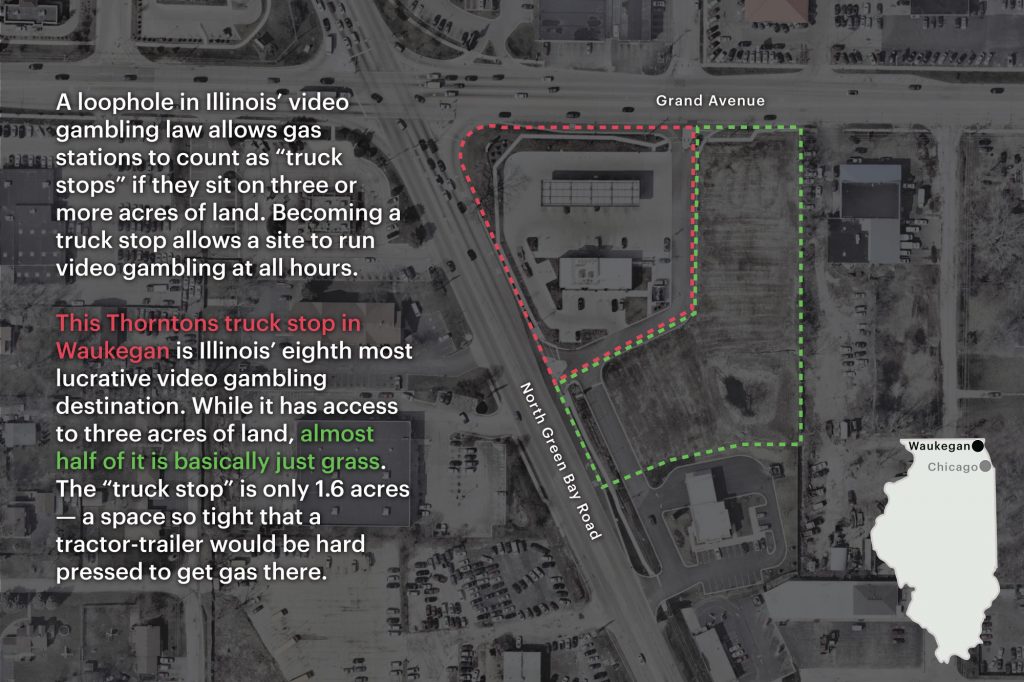
The Waukegan Thorntons sits on just 1.6 acres, leaving little room for a tractor-trailer to maneuver. But the Video Gaming Act is so vague that Thorntons was allowed to use the two vacant, grass-covered lots leased from Hochberg to count toward the three-acre requirement, according to documents from the gaming board and the city of Waukegan. Thorntons did not respond to multiple requests for comment.
The site narrowly escaped being shut down as the legislature rushed through the gambling expansion bill this year. Only a last-minute change saved the lucrative Tap Room site and dozens of other gas stations across the state.
Regulators at the gaming board have struggled for years with truck stop licenses because companies use the poorly worded law to shoehorn gas stations into the designation. So, as part of this year’s gambling expansion, the gaming board sought to tighten the requirements.
To qualify as a truck stop under the proposal, a location had to sell 50,000 gallons of fuel a month, include a separate diesel island for commercial vehicles to fuel up and have designated parking spaces. In exchange for tighter rules, a truck stop would be allowed to have 10 video gambling machines. The new requirements would have disqualified Thorntons.
The proposed amendment was included in the expansion bill that passed out of committee in the state House. But right before it went to the House floor for a full vote, the old truck stop rules were put back into the bill and a new category called “large truck stop” was created with the tighter requirements. Only large truck stops could get 10 machines.
The bill passed the House on a Saturday evening before sailing through the Senate the following afternoon. Once the governor signed the bill, on June 28, video gambling at the Waukegan Thorntons was in the clear.
Blue Island Democratic State Rep. Bob Rita introduced the amendment, which included multiple provisions in addition to the one for truck stops. A spokesman for Rita said Link and Rockford Republican State Sen. David Syverson were responsible for the truck stop language. Syverson didn’t respond to requests for comment.
Link said in an interview with ProPublica Illinois that the bill was changed because “it was so restrictive that 90 percent of the truck stops” in the state would be barred from having video gambling machines. At the same time, Link conceded that the current rules are too loose, allowing gas stations like the Waukegan Thorntons to qualify. He suggested the General Assembly would revisit the issue.
“That’s no more of a truck stop than I am,” he said. “I think this is something we will be addressing in the future.”
Dark Money and the Waukegan City Council
City Council races in Waukegan don’t usually attract much attention — or money — from outsiders. That changed during this year’s aldermanic elections, when Tap Room and its affiliates poured more than $200,000 into six races, according to an analysis of campaign finance records.
Most of the money came through the Waukegan Voter Alliance, a political action committee formed in January. The WVA is run by Koss, the former Link campaign manager who is also the treasurer of the Waukegan Democratic Organization PAC, the conduit for Tap Room donations to Cunningham during the 2017 mayoral race. Koss, who co-manages a media consulting group based in Waukegan called the Really Resourceful Group, declined to comment.
In addition to contributions directly tied to Tap Room, other donations came from Cunningham’s political campaign and Effingham-based J&J Ventures, the second-largest video gambling operator in the state.
In aldermanic elections that typically raise less than $10,000, the WVA had built up a war chest in a matter of weeks that allowed it to bankroll candidates for nearly every seat on the City Council.
The WVA backed six of the nine Waukegan aldermen. It spent the most in the city’s 9th Ward, where the alliance poured more than $77,000 into an effort to unseat Ann Taylor, who supported limits on video gambling and had been skeptical of a Waukegan casino. In races marked more by door-to-door canvassing than television commercials, WVA spent nearly $70,000 on TV ads for Taylor’s opponent, Annette Darden, according to state campaign records.
Taylor, who spent about $38,000 on her campaign, has since filed a complaint with the state Board of Elections alleging that Darden violated campaign rules by failing to report in-kind donations from the WVA. Darden and Taylor declined to comment. The Board of Elections complaint is pending.
Even after Taylor handily won the election, Darden continued to receive money from Tap Room-affiliated PACs. In April, yet another political action committee appeared, this one called the Small Business Coalition. It gave Darden more than $56,000. That group was founded by Jon Kozlowski, a Tap Room employee. The group’s address is listed on state records as a UPS Store a block from Fountain Square. Its only contributors are companies affiliated with Bond, including Tap Room Gaming, Tap Room Amusements and Bond’s public relations firm, State Street Public Affairs. Kozlowski did not respond to requests for comment.
Among the other aldermanic candidates the WVA supported was Roudell Kirkwood, who represents the city’s 4th Ward, which includes downtown. Gaming board records show Kirkwood owns a Chinese restaurant called Long Sing that has had video gambling since October 2017. Tap Room is the video gambling operator for the establishment, gaming board records show. Kirkwood did not respond to a request for comment.
When a local reporter began asking questions about the donations, Bond defended the WVA, saying it was formed to “protect hundreds of small businesses who have been under attack by some members of the Waukegan City Council.” The Tap Room donations, meanwhile, did not sit well with some local officials.
“I don’t care what kind of company you are,” said Florian, who didn’t get money from gambling PACs. “Even if you’re selling bicycles, anyone who is that interested in spending that much money on our City Council is a problem.”In March, a dark money group called the Waukegan Jobs Coalition sprung up. Its address is the same UPS Store as the Small Business Coalition, a block from Fountain Square. Because the group is not required to file campaign disclosures, it’s impossible to know who funded it. But state corporate records show the group’s manager, James Parks, was a longtime contract employee for Tap Room. He declined comment.
Within weeks of the group’s creation, television commercials and colorful mailers pushing for a casino at Fountain Square began appearing. Invoices for the television time the Waukegan Jobs Coalition purchased went to Koss’ company, the Really Resourceful Group, according to billing records obtained by ProPublica Illinois.
Around the same time, Cunningham and City Council members who received donations from Tap Room-funded groups started pushing to repeal some of the restrictions on video gambling. He also has testified at legislative hearings about the gambling expansion, praising video gambling and lobbying for a casino in Waukegan.
The WVA-backed candidates won four of the six seats on the nine-member City Council. Along with Cunningham, who breaks ties on City Council votes, Waukegan’s city government is now composed of five elected officials who received significant support from Tap Room. Site selection for the new casino is underway, and the City Council will have final say over which firms are sent to the gaming board for approval.
But for a Rust Belt city still smarting from the 2008 financial crisis, with crushing pension debt and a $3.7 million operating deficit, what a casino will do to lift it up remains to be seen.
Meanwhile, some local businesses that have come to rely on video gambling are worried about competition from a new casino cutting into their business.
“Of course I am concerned,” said Quan Hui Chen, owner of Hunan Hibachi Buffet, a Chinese restaurant and Tap Room client located across the street from Fountain Square. “The numbers will go down. And it pays the rent. But we can’t stop it.”
May, the former mayoral candidate, has watched these developments with despair. Her supporters have pressed her to make another run for mayor in 2021, she said. But after her bruising mayoral run, she had promised her husband she would get out of politics. They’ve even discussed leaving Waukegan altogether.
“I’m heartbroken,” she said. “I tried really hard and for the right reasons. But all the money flowing in from out of town …”
Her voice trailed off as she wiped away tears. “I raised my kids here, in the same neighborhood I grew up in. I love this city.”Correction, Aug. 9, 2019: This story originally misidentified James Parks as an employee of the Village of Antioch. He no longer works for the village.
-
Illinois has added nearly 555,000 jobs since mid-2010 — the lowest point in recent Illinois economic history — with approximately 64,000 positions added in the past year, according to a report from the state’s Commission on Government Forecasting and Accountability released Monday.
-
Not long after State Sen. Tom Cullerton (D-Villa Park) was indicted Friday morning on 41 total counts for earning $274,066 over three years for an alleged ghost payroll job with the Teamsters Joint Council 25, a statement from his attorney was defiant, calling the allegations against the Democratic state senator “simply not true,” and vowing to defend against the charges in court.
 State Sen. Tom Cullerton (D-Villa Park). [Submitted]
State Sen. Tom Cullerton (D-Villa Park). [Submitted]
Do you like this page?










